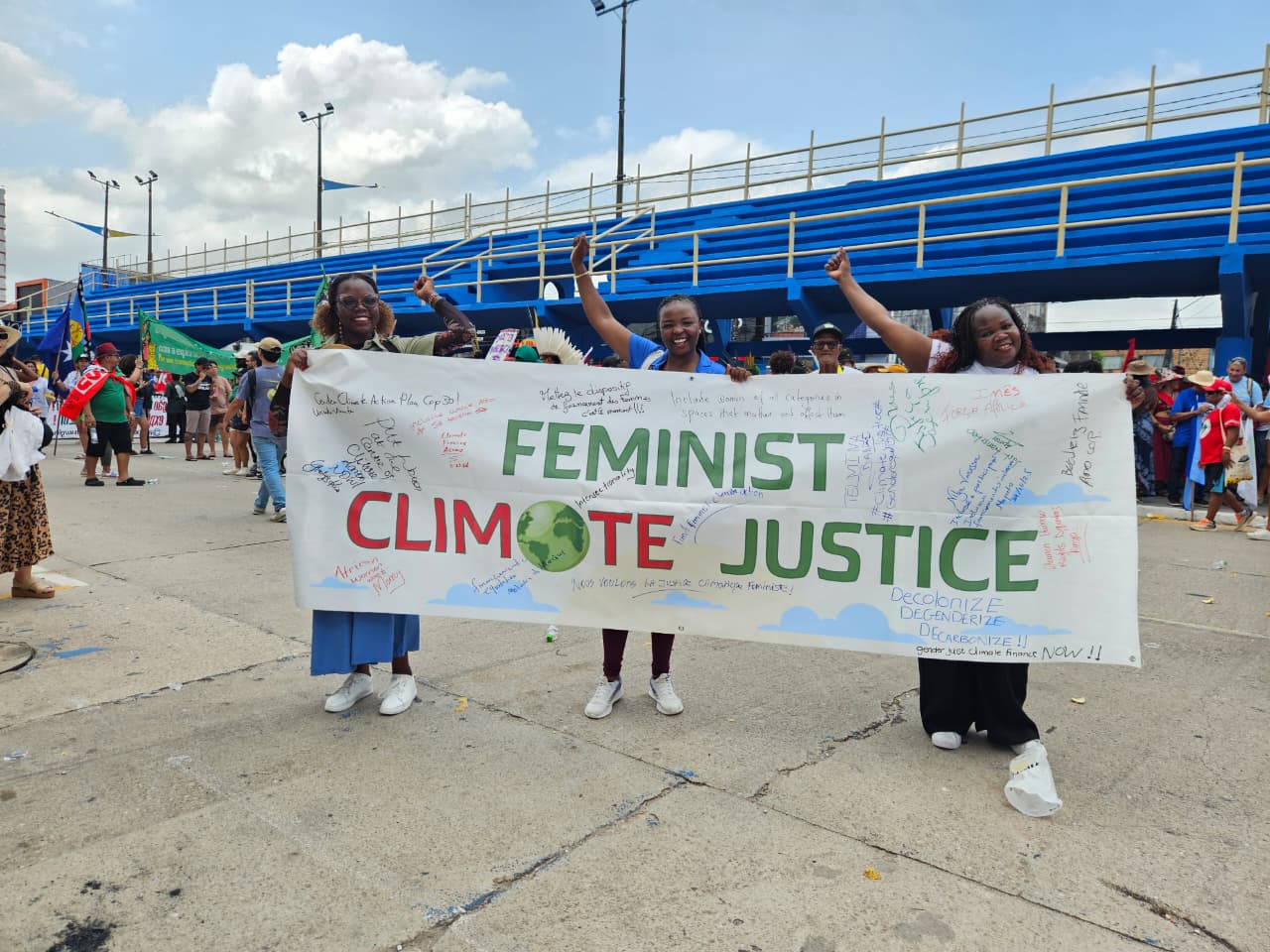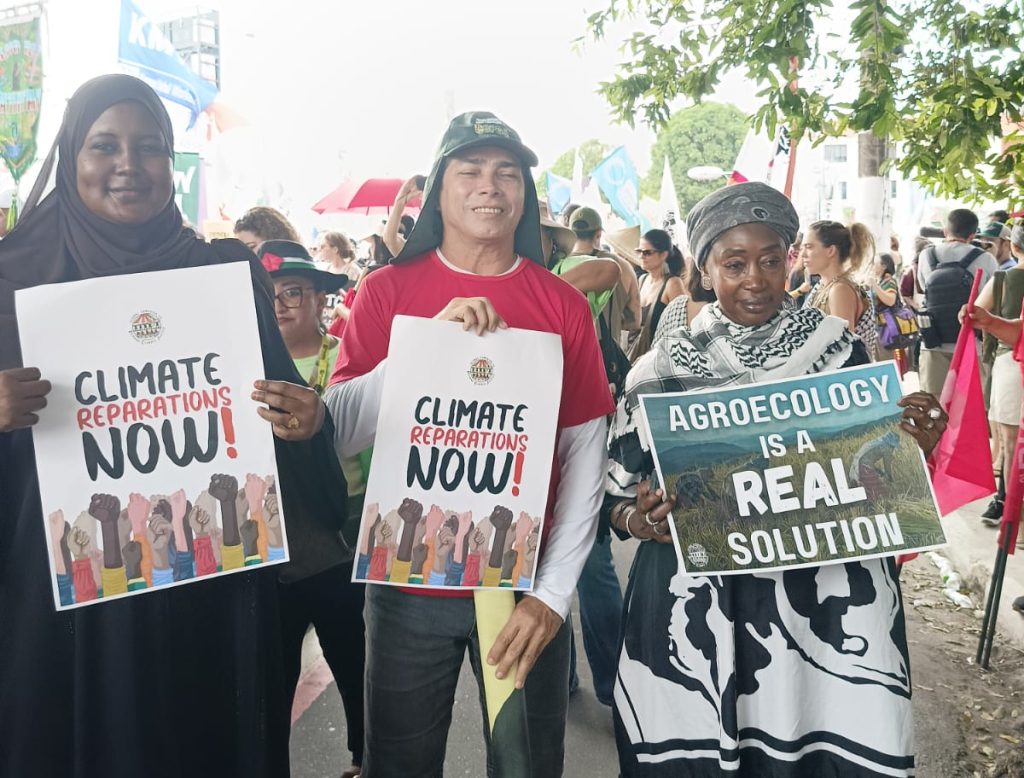
Marching for Climate at COP30: A Reflection on Indigenous Leadership, Feminist Solidarity, and the Power of People
The streets of Belém erupted into a powerful wave of colour, song, and resistance as thousands took part in the People’s March for Climate at COP30. It was the first time since 2021 that protesters were allowed to demonstrate outside the UN climate talks, reclaiming a key democratic space that had been restricted for years. Indigenous communities led the frontlines, joined by Brazilian youth groups, women’s rights organizations, and activists from around the world. For me, attending my first COP, the moment was nothing short of transformative, an overwhelming reminder that climate action begins not in negotiation rooms, but in the lived experiences and ancestral knowledge of the world’s original environmental defenders.
In the Amazon, Indigenous people’s relationship with the land goes far beyond conservation; it is spiritual, political, and deeply rooted in identity. As the march moved through the humid streets of Belém, the messages carried on banners, bodies, and chants were clear: Mother Earth is not simply a resource; she is life, memory, and future. Brazilian Indigenous women and youth, standing tall and grounded, brought this truth to life with a clarity that cut through the noise of global politics.

“We are not protestors, we are protectors. When you destroy our forests, you destroy our memory,” said Mariana Tupinambá, a young Indigenous leader from Pará whose voice rose above the crowd. Beside her, Iara Guajajara, an elder who has marched for over three decades, added, “The Amazon is not a resource. She is our mother. And mothers do not deserve violence; they deserve care.” Their words underscored a long-standing struggle: Indigenous communities have consistently been left out of climate decision-making despite being its strongest defenders.
This reality mirrors the African context, where Indigenous women and girls also bear the brunt of climate change while receiving the least recognition or support. Across the continent, women constitute 60–80% of the agricultural labour force, yet remain the least likely to own land. Droughts, floods, and shrinking resources intensify gender inequalities, pushing girls out of school, increasing unpaid care burdens, and heightening vulnerabilities such as early marriage and gender-based violence. During the march, FEMNET’s delegation stood in solidarity with Indigenous communities in Brazil, affirming the shared struggles that link Africa and the Amazon.
“African women are carrying the climate crisis on their backs — quite literally. Inclusion is not a request; it is a right,” shared Halima Hussein from Kenya, her words capturing the weight of gendered climate impacts.
Salimata BA from Senegal reinforced this, saying, “We are here to demand that Indigenous women, from the Amazon to the Sahel, are not added as an afterthought in climate policies. We are knowledge bearers, not beneficiaries.”
From Ethiopia, Azeb Kelemework Bihon, FEMNET’s Vice Chairperson representing the Eastern Africa region, spoke with conviction: “African Indigenous communities protect vast ecosystems, yet their value is rarely acknowledged in climate finance. Recognition without investment is tokenism.”
Their reflections highlighted a critical truth: gender justice and climate justice are inseparable, and any climate policy that ignores women, especially Indigenous women, is fundamentally incomplete.

Despite their vast knowledge and essential role in safeguarding ecosystems, only one in five countries meaningfully includes Indigenous peoples in national climate strategies. On Brazilian soil, COP30 presents a historic opportunity to change this narrative. Indigenous knowledge systems offer valuable tools, from sustainable land management to early warning mechanisms, that modern science alone cannot replicate. Without integrating these systems into global climate solutions, efforts to limit warming to 1.5°C will remain inadequate and inequitable.
The march in Belém reinforced a lesson that is both urgent and timeless: Indigenous communities must not only be invited into the climate conversation, but they must also be at its center. As I reflect on this moment, on my feet on Amazonian ground, on the voices that shaped the day, I am reminded that climate justice is a collective demand born from generations of stewardship, resistance, and hope.
This is more than a reflection. It is a call to action. We must shift from acknowledgement to structural change, from symbolic inclusion to meaningful participation, from pledges to protection. Mother Earth is calling, Indigenous women are leading, and the world must finally listen.
We cannot wait. We must act — boldly, urgently, and together.
